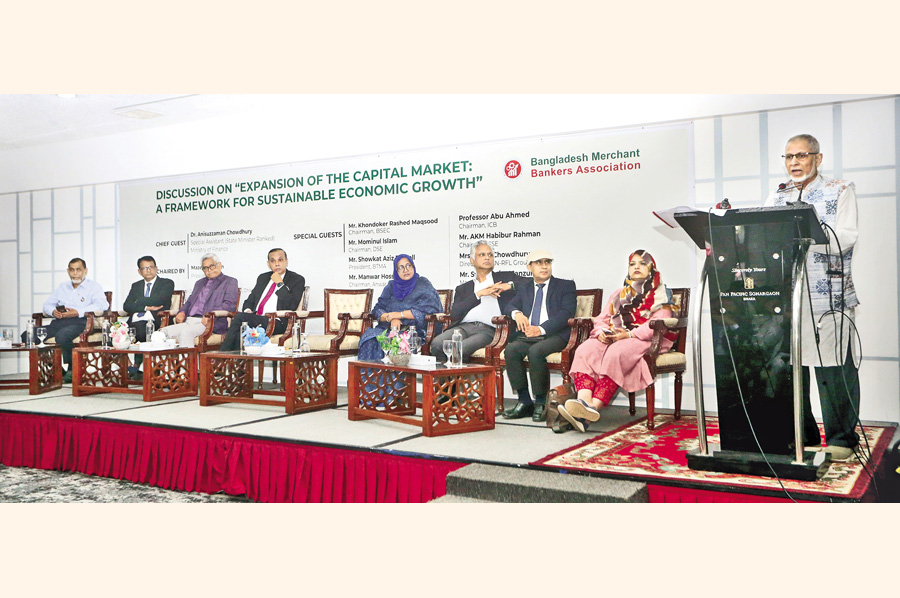
Published :
Updated :

A mismatch between the expenses of listing and incentives offered by the government is the reason why companies are reluctant to enter the secondary market, said speakers at a discussion on the capital market on Tuesday.
"No one comes to the capital market out of their corporate social responsibility. We (businesses) come to the market for raising funds when risk-return tradeoff looks promising," said Syed Nasim Manzur, managing director of Apex Footwear Limited.
Speaking as a special guest at the seminar titled "Expansion of the capital market: A framework for sustainable economic growth", he elaborated on what he considered main barriers to the growth of the market. The programme was organised by the Merchant Bankers Association at Pan Pacific Sonargaon Hotel in the capital.
Currently, the market has very few quality scrips. So, improving the depth of the market is an urgent issue to be addressed.
If the tax gap between listed and non-listed companies is 20 percentage points, it is worth listing. "A gap of 15 percentage points is also okay, but if we limit the gap to only 5 percentage points, then there is no incentive for listing because it involves high compliance costs," said Mr. Manzur.
Flawed IPO valuation method also comes in the way.
"We, issuers, are looking for a good valuation of our companies. The securities regulator cannot fix the price of primary shares. It [IPO share price] should be market driven, not NAV driven.
"In this wrong valuation method, companies like UBER will have zero value. Also, companies like Airbnb have zero value because they have no assets. Time has come that we move away from this kind of valuation method," said the chief of Apex Footwear.
Speakers at the programme also drew attention to the absence of buyback provision, lengthy IPO process, and inflexibility in IPO fund utilisation rules as obstacles to listing.
"You must allow exit [of the companies from the market]. You [regulator] should allow share buyback… Google, Apple buy back their own shares," said Mr Manzur.
Cumbersome IPO process is another major discouraging factor.
"We need at least 1.5 years to 2 years to collect capital through IPO in our country. In India or Sri Lanka, the process completes in 3 to 6 months. You cannot make plans in this situation. If I need funds for expansion, I will never go for an IPO, I will go to banks."
Mr Manzur also criticised restrictions on IPO fund utilisation.
Situations may arise that a company faces a pandemic immediately after fund collection through an IPO and the business plan has to change. "You cannot tie my hands for a few bad people who misused their IPO money."
In response to the remarks made by Mr Manzur, Mominul Islam, chairman of the Dhaka bourse, said they were trying to reduce the time and complexity of the IPO process.
The IPO process will be digitised as has been done in Pakistan and the time would be cut to two months, he said.
The lack of financial literacy among retail investors was also brought up.
"They think the issuer companies will always make profits. This is not practical. There are good days and bad days in business. There will be profits and losses. When companies incur losses, retail investors start complaining to the securities regulator.
"If investors don't want to bear losses, they should not invest in the capital market. Investors should be educated," said Mr Manzur.
Abul Kalam Azad, spokesperson of the Bangladesh Securities and Exchange Commission, said laws had been tightened following instances when IPO share price discovery process was manipulated and IPO funds were misused.
On buyback provision, he said the market watchdog would have no objection to it if the commerce ministry introduced necessary changes to the law to allow buybacks.
The chief guest, Dr. Anisuzzaman Chowdhury, special assistant to Chief Adviser Prof Muhammad Yunus, said solutions to all problems would come from open discussions.
"Interim government is open to discussions. Final reforms will come after a period of trial and error.
A frustrated Mr. Manzur said, "We have been watching the same presentation for the last 20 years. Time has come for reforms and we should enforce them now. Otherwise, we should forget that we had a capital market."
Mr Chowdhury urged listed firms to be transparent, submit proper financial statements and pay taxes. "Everyone wants incentives but doesn't pay taxes. We have a very poor tax-to-GDP ratio. We need to improve it."
farhan.fardaus@gmail.com


 For all latest news, follow The Financial Express Google News channel.
For all latest news, follow The Financial Express Google News channel.